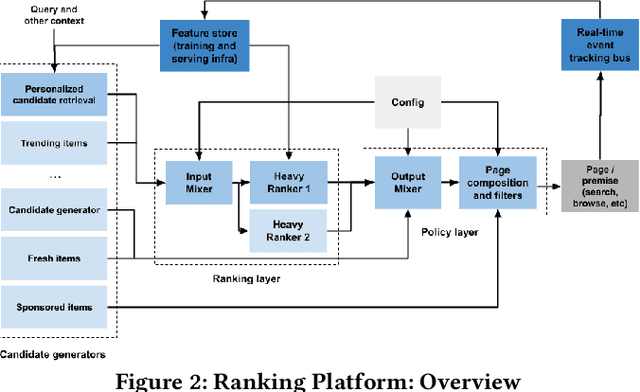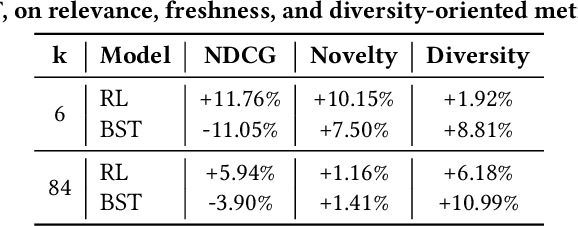Géraud Le Falher
Building a Scalable, Effective, and Steerable Search and Ranking Platform
Sep 04, 2024



Abstract:Modern e-commerce platforms offer vast product selections, making it difficult for customers to find items that they like and that are relevant to their current session intent. This is why it is key for e-commerce platforms to have near real-time scalable and adaptable personalized ranking and search systems. While numerous methods exist in the scientific literature for building such systems, many are unsuitable for large-scale industrial use due to complexity and performance limitations. Consequently, industrial ranking systems often resort to computationally efficient yet simplistic retrieval or candidate generation approaches, which overlook near real-time and heterogeneous customer signals, which results in a less personalized and relevant experience. Moreover, related customer experiences are served by completely different systems, which increases complexity, maintenance, and inconsistent experiences. In this paper, we present a personalized, adaptable near real-time ranking platform that is reusable across various use cases, such as browsing and search, and that is able to cater to millions of items and customers under heavy load (thousands of requests per second). We employ transformer-based models through different ranking layers which can learn complex behavior patterns directly from customer action sequences while being able to incorporate temporal (e.g. in-session) and contextual information. We validate our system through a series of comprehensive offline and online real-world experiments at a large online e-commerce platform, and we demonstrate its superiority when compared to existing systems, both in terms of customer experience as well as in net revenue. Finally, we share the lessons learned from building a comprehensive, modern ranking platform for use in a large-scale e-commerce environment.
On the Troll-Trust Model for Edge Sign Prediction in Social Networks
Feb 28, 2017



Abstract:In the problem of edge sign prediction, we are given a directed graph (representing a social network), and our task is to predict the binary labels of the edges (i.e., the positive or negative nature of the social relationships). Many successful heuristics for this problem are based on the troll-trust features, estimating at each node the fraction of outgoing and incoming positive/negative edges. We show that these heuristics can be understood, and rigorously analyzed, as approximators to the Bayes optimal classifier for a simple probabilistic model of the edge labels. We then show that the maximum likelihood estimator for this model approximately corresponds to the predictions of a Label Propagation algorithm run on a transformed version of the original social graph. Extensive experiments on a number of real-world datasets show that this algorithm is competitive against state-of-the-art classifiers in terms of both accuracy and scalability. Finally, we show that troll-trust features can also be used to derive online learning algorithms which have theoretical guarantees even when edges are adversarially labeled.
Even Trolls Are Useful: Efficient Link Classification in Signed Networks
Feb 29, 2016



Abstract:We address the problem of classifying the links of signed social networks given their full structural topology. Motivated by a binary user behaviour assumption, which is supported by decades of research in psychology, we develop an efficient and surprisingly simple approach to solve this classification problem. Our methods operate both within the active and batch settings. We demonstrate that the algorithms we developed are extremely fast in both theoretical and practical terms. Within the active setting, we provide a new complexity measure and a rigorous analysis of our methods that hold for arbitrary signed networks. We validate our theoretical claims carrying out a set of experiments on three well known real-world datasets, showing that our methods outperform the competitors while being much faster.
 Add to Chrome
Add to Chrome Add to Firefox
Add to Firefox Add to Edge
Add to Edge